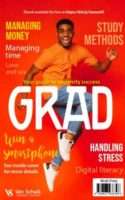Selecting the right course to study at university or college is important, as it affects not only your university experience, but what you can do afterwards.
This decision is like an old-fashioned cooking pot. It stands on three legs.
The first leg: what are your interests? What do you like doing? Which subjects do you enjoy most? Do you have hobbies that keep you busy for hours? Do you play sport? Or a musical instrument? Do you like being outside, perhaps with animals, or would you rather be indoors? If so, what do you do indoors? Do you like parties, or would you rather be on your own? What makes you happy? Write down all your ideas.
Try and create a picture of how you would like to live your life once you start working. In an office as part of a big company; outdoors working in the veld or with animals; playing music; working as a scientist, doing research all by yourself … what would make you happy?
What are your talents? This is the second leg of the pot. What do you do well? What are your strongest subjects? How about your hobbies – do you sing really well? Or play soccer well? (It’s best if it’s not just your own opinion here!) Write down these ideas as well. They will help you to answer the question about what you can do, not just what you want to do.
Now look at where your interests and your talents overlap. What do you like doing that you are also good at? Chances are quite a lot, because we usually enjoy what we are good at and are good at what we enjoy. That combination of interest and talents will show you clearly which field you should be in. Perhaps it’s figures – maths, accounting. Or languages. Or understanding the world through history and economics. Or turning your hobby, like soccer, into a career.
Now you have to consider the third leg of the pot. How can you earn a living? Most of us need education primarily to earn money. That means that your chosen field must qualify you for a job. In many cases, this is not of primary importance in choosing your first degree, because many degrees are quite general. Languages will qualify you for journalism, copywriting, teaching, scriptwriting, and a whole range of possibilities that may not even exist at the moment. The same is true of the commercial field. A general BCom can take you into any number of public service, business, banking or accounting jobs. Information Technology (computer studies) is also becoming increasingly central to almost every organisation. On the other hand, music or history of art may be what your heart desires, but the career opportunities are limited. Consider including that in a more general selection of subjects to broaden your scope.
Sport might help you find funding, and professional sport is a business in itself these days. If you want to go that way, include subjects that will help you in the job market, like those focused on business or management skills. If you are not sure about what you want to do after graduating, start in one of these general directions.
Be careful in your choice of faculty, because it will be easier to change subjects within a faculty without adding time to your studies than moving from, say, Humanities to Commerce. Only if you are really sure of what you want to do should you choose a specific path like medicine or engineering.
If you can, attend open days and career guidance workshops. There may be any number of possibilities that you have never even heard about. The Pace Career Centre provides excellent tools for helping you decide what and where to study, including a career questionnaire for clarifying your interests and aptitudes.
The next step is to apply for a place at university or college. Don’t think only of the ones you happen to know about. Study the programmes offered by other institutions. Find one that fits your chosen field of study. Consider practical issues like cost – fees and accommodation costs vary widely.


